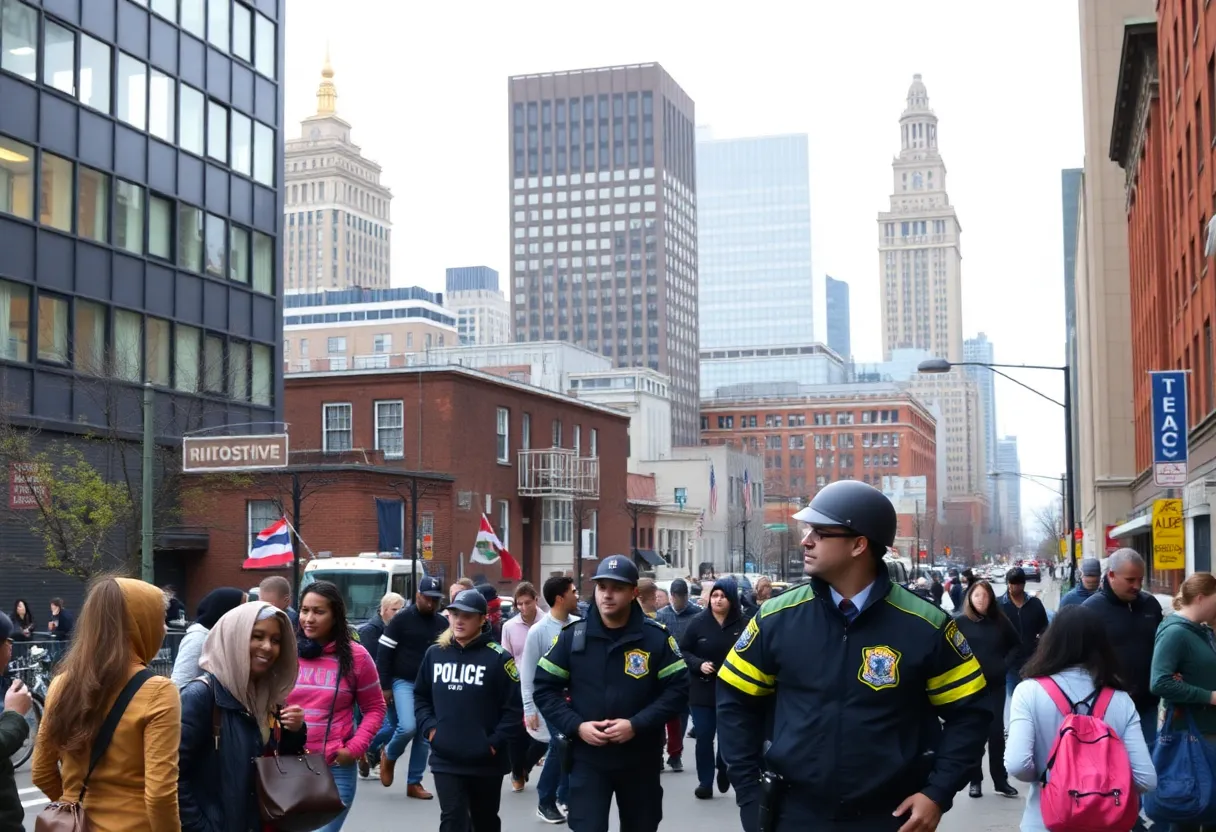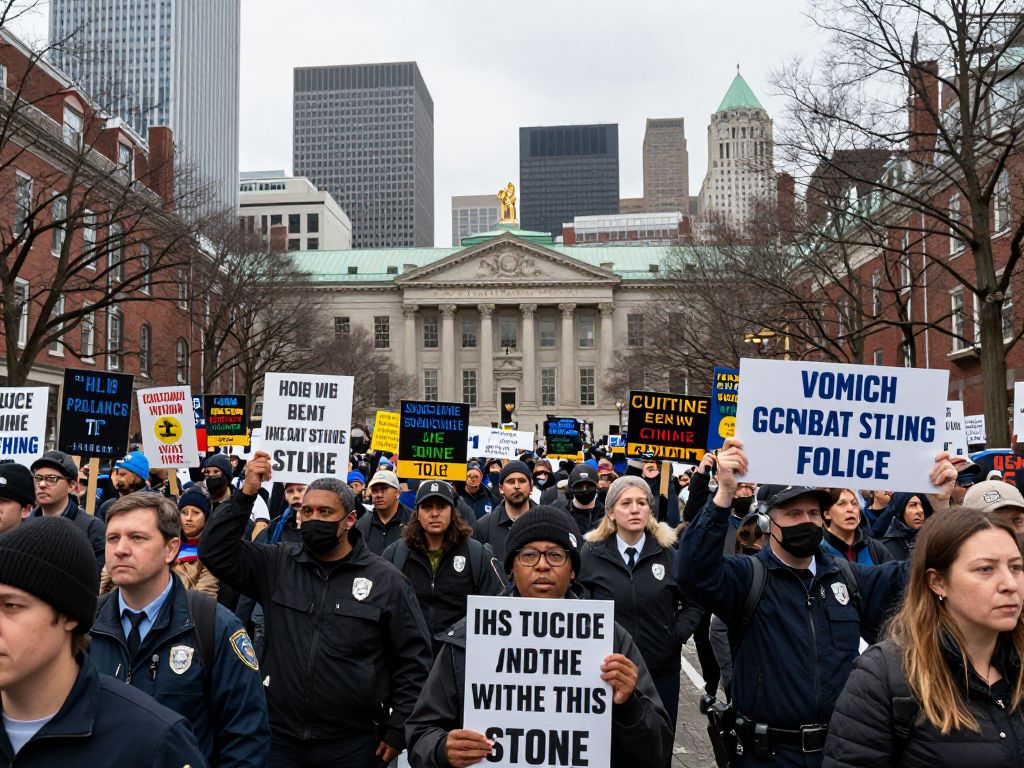Boston, August 20, 2025
News Summary
Boston city officials have announced their commitment to maintaining local sanctuary policies in the face of federal enforcement threats from the U.S. Department of Justice. The mayor emphasized that the city’s laws limiting cooperation with federal immigration arrests will remain in effect, citing constitutional concerns regarding the federal demands. While ensuring public safety through cooperation with federal authorities on crime-related matters, Boston’s stance reflects ongoing national debates about immigration enforcement and local jurisdiction rights.
Boston
Mayor Announces Boston will Maintain Sanctuary Policies Amid federal enforcement threats
Boston city officials said they will continue enforcing local policies that limit city involvement in federal immigration arrests after the U.S. Department of Justice sent formal notices to multiple states and local governments warning of potential legal action and loss of federal funds. The mayor characterized the federal letters as unconstitutional and reaffirmed that Boston’s laws and practices will remain in effect while the city follows state law restricting local cooperation with federal immigration enforcement.
Key developments
- Federal notice: The U.S. Department of Justice sent letters identifying 13 states and 22 local governments as jurisdictions of concern for policies described as limiting federal immigration enforcement. The letters warned of possible prosecution or financial consequences for failing to assist federal authorities.
- Response from the mayor: Boston’s mayor publicly rejected the DOJ’s demands and restated the city’s commitment to its local policy framework, noting that Massachusetts law places limits on local law enforcement involvement in federal immigration matters.
- Deadline: Targeted jurisdictions were asked to confirm their commitment to complying with federal law and to detail steps they would take to remove barriers to federal immigration enforcement by August 19.
- Local policy specifics: Boston enforces the Trust Act, which prevents local police from detaining individuals solely on the basis of immigration detainer requests unless a criminal warrant exists.
Supporting details and local context
City officials emphasized that Boston continues to cooperate with federal authorities on public-safety matters such as counterterrorism and human-trafficking investigations, distinguishing that work from routine immigration enforcement. The mayor and local leaders framed the city’s approach as consistent with state law and public-safety priorities, and they said the city will defend its policies in the face of federal pressure.
The DOJ letters outlined potential enforcement options, including civil litigation and the withholding of federal funds, if jurisdictions were found to be unlawfully obstructing federal immigration operations. The correspondence asked jurisdictions to provide detailed plans that would allow federal officials to perform immigration enforcement without interference from local policies.
City officials and community members present at a local press event showed public support for maintaining sanctuary-style policies, and the mayor’s office submitted a written response to the DOJ reiterating that state law limits local involvement in immigration enforcement and asserting constitutional concerns about the federal demands.
Broader national response
Several other states and counties signaled similar resistance to the DOJ notices. State attorneys general and local officials from jurisdictions such as Washington State, Cook County (Illinois), and Connecticut stated intentions to defend their policies and to clarify how their practices comply with federal law. Some cities also sought to refine their public messaging—describing themselves as welcoming communities while explaining the legal limits on local enforcement action.
Legal and policy background
The dispute is part of an ongoing national debate over the scope of federal immigration enforcement and the role of state and local governments. Sanctuary or “limited-cooperation” policies typically aim to prioritize local resources for public-safety priorities and to encourage community cooperation with police by reducing fear of immigration-related detention. Federal authorities argue that such policies can impede immigration enforcement; local authorities and some state officials argue that federal attempts to compel cooperation exceed constitutional limits or conflict with state law.
Legal outcomes will likely depend on litigation, statutory interpretation, and potential negotiations between federal and local governments. The August 19 response deadline creates a near-term administrative milestone, but legal challenges and policy disputes may extend beyond that date.
Next steps
- Boston will maintain current procedures consistent with the Trust Act and Massachusetts law while monitoring any federal legal action.
- Other targeted jurisdictions may file legal challenges, provide compliance plans, or seek to negotiate with the Department of Justice.
- Congressional or judicial developments could change enforcement approaches or funding outcomes over the coming months.
Frequently Asked Questions
What did the Department of Justice do?
The DOJ sent letters to 13 states and 22 local governments warning that certain local policies may obstruct federal immigration enforcement and asking those jurisdictions to confirm steps they will take to comply with federal law by August 19. The letters mentioned possible legal action and loss of federal funds as enforcement options.
What is the Boston Trust Act?
The Trust Act is a local policy that restricts Boston police from holding individuals solely on immigration detainer requests unless there is a criminal warrant. The policy is intended to limit routine local participation in federal immigration enforcement while allowing cooperation on criminal investigations and public-safety operations.
What could happen if jurisdictions do not comply with the DOJ request?
The DOJ warned of potential civil litigation and the withholding of federal funds. Any specific consequences would be subject to legal processes and possible court rulings. Jurisdictions have indicated some will defend their policies in court or negotiate with federal authorities.
How is Boston cooperating with federal authorities?
City officials say Boston continues to work with federal agencies on matters such as counterterrorism and human-trafficking investigations, while limiting local participation in routine immigration detentions under state and local law.
What are the likely next steps?
Targeted jurisdictions may respond to the DOJ by the stated deadline, seek judicial review of the federal demands, or open negotiations. The outcome will depend on legal rulings, political developments, and any administrative changes at the federal or state level.
Quick Reference Table
| Item | Details |
|---|---|
| Jurisdictions targeted | 13 states and 22 local governments received DOJ letters identifying potential obstruction of federal immigration enforcement. |
| DOJ deadline | August 19 (date by which jurisdictions were asked to confirm compliance steps). |
| Potential federal actions | Civil litigation, withholding of federal funds, and other enforcement measures referenced in DOJ correspondence. |
| Boston policy | The Trust Act limits local police from detaining people solely on immigration detainers unless a criminal warrant is present; city officials maintain cooperation with federal agencies on criminal and national-security matters. |
| Where to find official information | City of Boston official statements, Massachusetts state legal guidance, and Department of Justice communications provide primary source details and next-step instructions for affected jurisdictions. |
Deeper Dive: News & Info About This Topic
HERE Resources
Boston Officials Defend Sanctuary Policies Amid Federal Pressure
Boston Mayor Stands Firm on Sanctuary Policies Amid Federal Pressure
Mayor Michelle Wu Defends Boston’s Sanctuary City Policies Amid Migrant Arrests
Boston Rejects Federal Demand on Immigration Policies
Boston Mayor Defends Sanctuary Policies Amid DOJ Deadline
Boston Leaders Stand Firm on Sanctuary Policies Amid Federal Pressure
Trump Amplifies Federal Policing in Washington, D.C.
Boston Mayor Faces Challenges with Federal Grant and Trust Act
Boston Designated as Sanctuary Jurisdiction by DOJ
Boston Mayoral Election: Wu vs. Kraft
Additional Resources
- Fox News: Boston’s Wu Fires Back
- Wikipedia: Sanctuary City
- WCVB: Wu Bondi Letter Response
- Google Search: Sanctuary City Boston
- The Guardian: Boston Sanctuary Cities
- Encyclopedia Britannica: Immigration Policy
- NBC Boston: Deadline for Boston’s Response
- Google Scholar: Boston’s Sanctuary Policies
- CBS News: Boston Sanctuary Cities Policies
- Google News: Boston’s React to DOJ Sanctuary Letter
- BU News Service: Wu Files Appeal

Author: STAFF HERE BOSTON WRITER
The BOSTON STAFF WRITER represents the experienced team at HEREBoston.com, your go-to source for actionable local news and information in Boston, Suffolk County, and beyond. Specializing in "news you can use," we cover essential topics like product reviews for personal and business needs, local business directories, politics, real estate trends, neighborhood insights, and state news affecting the area—with deep expertise drawn from years of dedicated reporting and strong community input, including local press releases and business updates. We deliver top reporting on high-value events such as Boston Marathon, Head of the Charles Regatta, and Boston Harborfest. Our coverage extends to key organizations like the Greater Boston Chamber of Commerce and Associated Industries of Massachusetts, plus leading businesses in finance, biotech, and insurance that power the local economy such as Fidelity Investments, Biogen, and Liberty Mutual Insurance. As part of the broader HERE network, we provide comprehensive, credible insights into Massachusetts's dynamic landscape.





